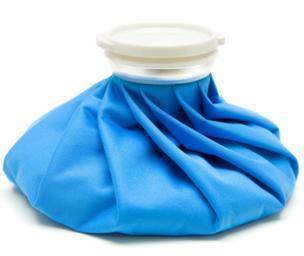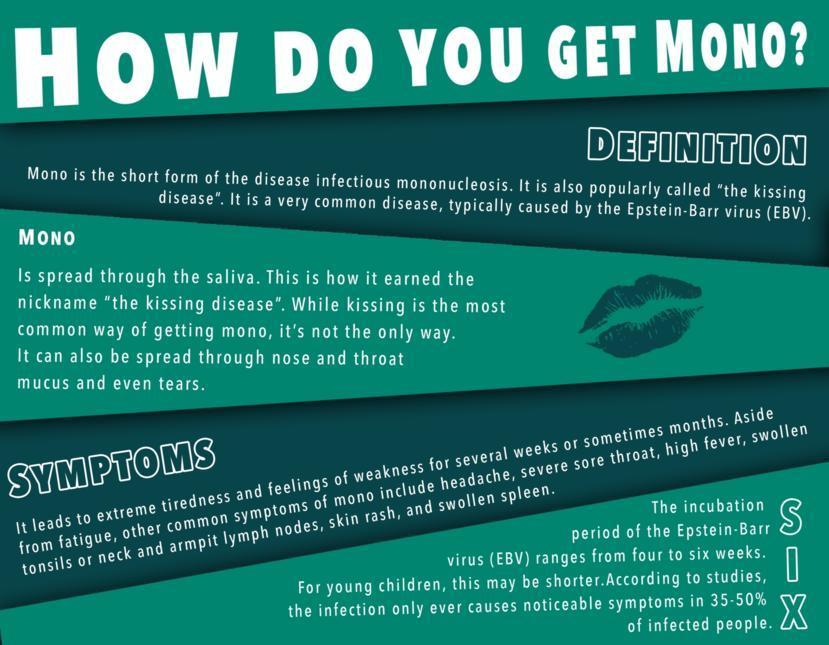How Do You Get Mono?

What is mono?
Mono is the short form of the disease called infectious mononucleosis. It is also popularly called as the "kissing disease". It is a very common disease, typically caused by the Epstein-Barr virus (EBV). It leads to extreme tiredness and feelings of weakness for several weeks or sometimes months. Aside from fatigue, other common symptoms of mono include headaches, severe sore throat, high fever, swollen tonsils, neck, and armpit lymph nodes, skin rash, and a swollen spleen.
Some cases of mono can cause the spleen to swell. This symptom requires the most caution for patients with mono. Spleen swelling places the person at risk for a ruptured spleen, which would require surgery. You will know if your spleen has ruptured when you experience a sudden sharp pain in the left side of your upper abdomen.
There are also rare cases of chronic and active EBV infection. The disease is characterized by the symptoms of mono persisting for six months or more after the diagnosis. However, mono is not generally dangerous or life-threatening. In fact, children may contract the virus and never show any symptoms at all. If anything shows, symptoms in children will be mild enough and may go unnoticed. Mono cases in teens and young adults are more noticeable. As people grow older, they develop an immunity against EBV. It means that the virus does not affect them, and they will not experience the symptoms associated with mono.
While mono is usually pretty harmless and easily treatable at home, critical complications may arise. Doctors and patients have to worry about the possible complications more than the symptoms of mono itself. This is especially important for people with autoimmune diseases such as AIDS. Because they do not have strong immune systems as other people do, a simple infection may pose a real danger to their health. This is also true for people who are taking medications that can suppress the immune system. These are typically people who have just undergone an organ transplant.
The following complications may arise when a person is infected with mono:
- Liver problems like hepatitis and jaundice
- Blood problems like anemia and thrombocytopenia
- Heart problems like myocarditis
- Nervous system issues like meningitis, Guillain-Barre syndrome, and encephalitis
- Suffocation caused by extreme swelling of the tonsils that could block a person’s air passage
How do you get mono?
Mono is spread through the saliva. This is how it earned the nickname "kissing disease". While kissing is the most common way of getting mono, it is not the only way. It can also be spread through nose and throat mucus and even tears.
You can prevent spreading the virus by avoiding certain activities if you have mono, or if you suspect that you have the disease. The activities you should avoid include kissing, obviously, but also sharing drinking glasses, dining utensils and toothbrushes.
How many times can you get mono?
A person will only contract the common mono virus once. After that first time, the virus will always remain in the person’s system. The good news is that the symptoms do not often recur. It is not the same with chronic diseases where you always feel tired or weak. The virus primarily remains dormant in the system. However, there are times when the virus may become active again. If this happens, it can spread to other people who have not had the disease before. In this case, that person will experience the symptoms of mono, too.
It is only in very rare cases that mononucleosis symptoms recur. This can happen months or years later. It is usually observed in people with weakened immune systems like AIDS patients. However, it must be noted that mono symptoms are very similar to the symptoms of hepatitis and toxoplasmosis. So, if you encounter the same symptoms, it is best to consult your doctor to determine whether it is just mono again or something more.
Mono is one of the most common diseases because it can be easily transferred from person-to-person. In fact, by adulthood, almost everyone will have been infected by the mono virus.
What are some of the other ways you can get mono?
Mono is known as the “kissing disease” because kissing might just be the most common way to spread the Epstein-Barr virus (EBV). However, it is not the only way. Mono can also be spread in several other ways. They include contact with mucus from the nose and throat, and even tears.
If you share utensils or drinking glasses with a person infected with EBV, you can possibly contract the disease. Another scenario is wiping someone’s tears, and then not washing your hands before eating. Sharing a sandwich or feeding each other with the same spoon or fork are also possible ways of spreading mono.
How fast can you get mono?
The incubation period of the Epstein-Barr virus (EBV) ranges from 4-6 weeks. For young children, it may be shorter.
According to studies, the infection only causes noticeable symptoms in 35-50 percent of infected people. Despite contracting the virus, people’s everyday tasks and lives are rarely disrupted by mono.
Some groups have a higher risk of getting mono. Those who are at higher risk are individuals ranging from 15-30 years of age, typically students because of the large population that they are exposed to every day. This is also applicable for people in the medical field such as doctors, interns, nurses, and caregivers. The reason is that individuals in the medical field are constantly in contact with people who are sick, which takes a toll on their immune system.
Finally, mono is dangerous for people who have suppressed or weakened immune systems including patients with AIDS and those who have just had organ transplants.
How do you get tested for mono?
To determine whether you have mono, you should consult a doctor. He or she will ask you questions about your symptoms and your medical history. The doctor will also examine your physical condition. The doctor will examine your throat and skin as well as press on your abdomen to check for tenderness. This way, the doctor will be able to tell whether your condition matches that of a mono infection.
The doctor may also ask you to take blood tests to rule out other diseases with similar symptoms. There are blood tests specific for mono. These are Monospot test and EBV antibody test. However, do note that it is possible to get a false negative on the Monospot test if you are still in the early stages of the infection. Your doctor may also recommend a complete blood count or CBC test to rule out other infections or even complications caused by mono.
How do you get rid of mono?
As previously mentioned, mono is not usually dangerous or life-threatening. Some will even contract the virus and never show any symptoms. For many people, fever and sore throat are so common that they would just wait it out.
Getting plenty of rest, eating nutritious food, and practicing good self-care habits are enough to get rid of your mono bug. You can also try the following tips:
- Get plenty of rest by staying at home in bed, if necessary. Listen to your body and don’t push yourself too hard.
- Stay hydrated and drink plenty of water. Drinking plenty of fluids can help lower the fever and prevents you from getting dehydrated.
- Keep your body cool by using an ice bag. Wiping your arms, legs, neck, and face with a wet cloth helps, too. Aside from lowering your fever, it helps you feel more comfortable as well.
- Eat nutritious and easily digestible food like chicken soup.
- Chomp down on plenty of fruits and veggies that are rich in vitamin C to boost your immune system. Some examples of these fruits are papaya, strawberries, oranges, grapefruit, and kiwi. For veggies, try bell peppers, broccoli, Brussels sprouts, bok choy, and kale.
- Gargle with salt water. It is even better if the water you use is slightly warm. Gargling warm salt water helps relieve a sore throat. Salt is also a good bacteria killer. If you are ready for an added kick, add baking soda to the mixture to make it more potent. Try adding ¼ teaspoon of baking soda and ⅛ teaspoon of salt in a cup of warm water. Swish every three hours or as needed.
- Use throat lozenges to reduce irritation and pain in the throat. This tip is also kid-friendly since throat lozenges are similar to candies.
- Try the lemon-honey combination. Dilute honey in some warm water and add a squeeze of lemon juice. You can also add honey in tea, or just drink plain honey diluted in water.
- Peppermint has antibacterial, antiviral, and anti-inflammatory properties. Drink peppermint tea or use a spray that contains peppermint oil. Its minty taste will also provide relief for your sore throat.
- Use over-the-counter pain medications such as acetaminophen (Tylenol) and ibuprofen (Advil). Be cautious about giving aspirin to patients below the age of 20.
Mono also causes your spleen to enlarge. So, while you are sick, avoid engaging in contact sports and heavy lifting. These activities may increase the risk of your spleen bursting.
If your symptoms don’t ease up within a week, it may be time for you to speak with your doctor. For symptoms that are severe, your doctor may prescribe certain medications. Corticosteroids are particularly effective. This type of medicine reduces swelling of the tonsils and spleen as well as relieve a sore throat. It helps decrease the severity of the infection and shortens the duration of the disease.


































